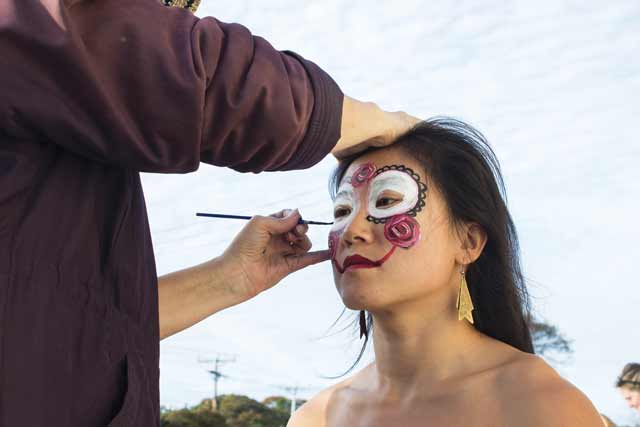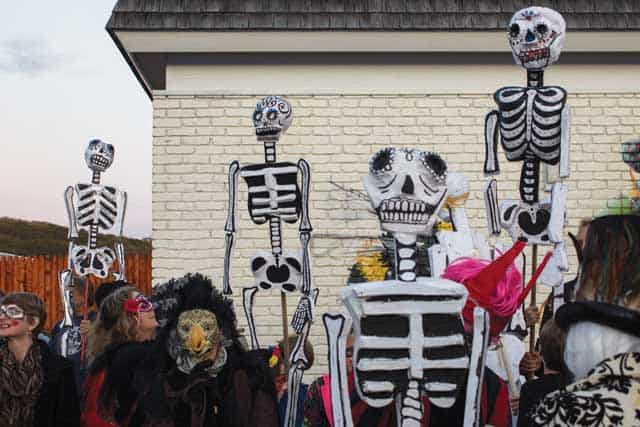Photo: Alik Versocki
The Day of the Dead Goes Global
by Steve Desroches
The pharmacy at Outer Cape Health Services on Harry Kemp Way is all decked out for Halloween. A few black bats, jack o’lanterns, and dancing skeletons greet those there to pick up a prescription. Rooted in ancient Celtic traditions, as a holiday, Halloween has become uniquely American since its introduction to North America by Irish and Scottish immigrants, though it’s gone through many incarnations as it continues to evolve as a cultural celebration. But a second look at the decorations signals another influence, also led by immigration and its contributions to our culture at large. While one skeleton is basic in its design, its pair features brightly colored designs recognizable as the iconic imagery of the Mexican holiday Día de los Muertos, the Day of the Dead.
While distinctly different holidays in their cultural roots, and of no relation, both Halloween and the Day of the Dead are going global, expanding from their native countries, and in some cases being melded together. In part, the phenomenon is obviously related to the date October 31, Halloween itself, and the beginning of the Day of the Dead celebration that culminates on November 2, as well as both holidays addressing death in some fashion. Both holidays also pre-date Christianity, but underwent incomplete transformations as the Catholic Church tried to stamp out the pagan rituals. In fact, prior to Spanish colonization, the Day of the Dead was celebrated at the beginning of summer, until it was moved to coincide with the Christian All Saints’ Day, which itself piggy-backed onto the Celtic harvest festival Samhain, trying to overtake it, but ultimately ended up as modern day Halloween. But just like people, cultures also move and know no borders. Now, it’s become common for children to trick or treat on the Day of the Dead in Mexico, and in turn, for the traditions of the holiday to become infused within American Halloween celebrations, as well as Day of the Dead events being held beyond communities near the border with Mexico. With the United States and Mexico both cultural giants in the world, each holiday has also maintained cultural independence with distinct celebrations. While Halloween is celebrated in places like the Netherlands, Sweden, and Germany, the Day of the Dead has spread throughout Latin America and has popped up everywhere from Australia and Fiji to the Czech Republic… and Provincetown.

“For me it makes it all the more important to do this,” says Walsh. “To have a visual celebration of a culture that is being demonized.”
Since the Festival began its offered workshops on making traditional Day of the Dead crafts such as masks, tin art, sugar skulls, papier-mâché skeletons, literary calaveras (poetic epitaphs), and ofrendas, a ritual alter featuring a variety of objects to honor a deceased loved one. There is also of course a procession down Commercial Street on November 2, which is followed by an exhibition in the lobby of the Provincetown Theater of the ofrendas made by local residents, followed by a performance and a dance party. And as mentioned earlier, there is a screening of the Academy-Award-winning animated film Coco, which has introduced millions around the world to the Day of the Dead and is one reason the Mexican holiday is spreading internationally.

As the Day of the Dead increasingly becomes celebrated in America, and elsewhere, a larger conversation about cultural appropriation and where the boundaries between it and cultural exchange and expansion lie continues. Just before the first Festival, Walsh did receive a few questions of concern regarding cultural appropriation, all from white, non-Hispanic people. But worry soon dissipated as the Festival was seen as promoting the culture, rather than co-opting it, making money off of it, or claiming it. Much of the Festival events on November 2 are presented in both Spanish and English, as are the printed materials. On a national level, the discussion of the very real action of cultural appropriation is coming into a more nuanced view, as many see the current response to be reflexive rather than thoughtful. Last year, in an article titled “How Fear of Cultural Appropriation Is Canceling Out Cultural Education,” Latina writer Pauline Campos begins with the lead, “I really wish other people would stop getting mad on my behalf,” and goes on to delineate between cultural appropriation and exchange in discussions around the expansion the Day of the Dead, globally. Both Campos and Walsh talk about intention, honor, and respect as the biggest differing factor, and great strides are being taken with the Festival in Provincetown to insure it’s a celebration of Mexican culture rather than an attempt to appropriate.
“It’s very much on the forefront of my mind that this is a tradition from Mexico, and I am not Mexican and neither are any of the planners,” says Walsh. “The intention since the beginning is to share, honor, and explore this aspect of Mexican culture and how it can be applied to our lives here in Provincetown.”
The Provincetown Day of the Dead Festival events runs now through Friday, November 2. For more information visit provincetowndayofthedead.com.
Day of the Dead Celebrations
Friday, November 2
All events are free, though donations are accepted.
The Harbor Hotel, 698 Commercial St.:
4:30 p.m. Face painting and festivities begin at the Harbor Hotel
5:30 p.m. Procession from the Harbor Hotel to the Provincetown Theater, 238 Bradford St., via Commercial Street.
Provincetown Theater, 238 Bradford St.
6 p.m. Ofrenda Exhibition – Ofrendas (“offering” in Spanish) are created to honor a deceased loved one and to welcome their spirit back for a visit.
7 p.m. Featured Performance – Artist Pooja Prema of Rogue Angel Theater has been deeply influenced and taught by the aesthetic, ritual and performance traditions of her homeland- Kerala, South India. Her work is about creating a container in which to grieve, to feel, and then to allow the very real possibility of personal and collective healing.
8:30 p.m. Dancing with the Dead – music by DJ Emerson and White Animal Sound











